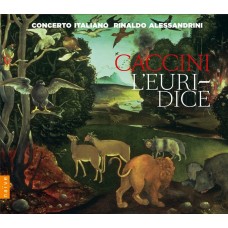卡契尼:尤麗狄絲 Caccini, G: Euridice
"‘A controversy attended the birth of opera: the first in a long series that has continued right down to our own time. The marriage of Maria de’ Medici to Henri IV of France, celebrated in Florence on 5 October 1600, provided the opportunity for Jacopo Peri and Giulio Caccini (known as ‘il Romano’) to beget what can be regarded as the first opera of which we still have a trace today: L’Euridice, on a text by Ottavio Rinuccini.’ ‘We date the invention of opera to the early seventeenth century, with the final codification of solo vocal music, attributing its paternity rather to a general cultural move-ment that exalted the subjective dignity of the performer and the perceptive taste of the listener, forever bound to-gether from this moment onwards in the genre of opera, which has come down to us richly charged with a history that embraces not only music, but also all the literary and visual arts.’ ‘More than four hundred years separate us from Caccini’s Euridice, and it is this that constitutes the greatest obsta-cle to our understanding of this first dramatic event to combine text and music on a stage. Many things have hap-pened in the past four centuries, events that distance us from the stylistic meaning of L’Euridice, making it almost incomprehensible. But there is a means that can put us back in touch with a primordial and primitive truth. Cacci-ni, like Peri, contextualises and makes concrete the necessi-ty of individual and subjective expression, through the human voice. Both of them theorise, invent, and demand that theatrical imitation be made visible through the indi-vidual contribution of the performer. They theorise and demand passion [l’affetto] as the primary condition that legitimises this new style – for it is a question of style even before that of a new kind of composition.’ -- Rinaldo Alessandrini Excerpts from the presentation text"
|
1 [Sinfonia] 1'18 PROLOGO 2 [La Tragedia] Io, che d'alti sospir vaga 4'01 ATTO UNICO 3 scena 1 [Pastore] Ninfe, ch'i bei crin d'oro 3'17 4 scena 1 [Euridice] Donne, ch'ha miei diletti 2'30 5 scena 1 [Ninfa] Itene liete pur 4'18 6 scena 2 [Orfeo] Antri, ch'ha miei lamenti 5'35 7 scena 2 [Dafne] Lassa, che di spavento 7'28 8 scena 2 [Orfeo] Non piango, e non sospiro 1'27 9 scena 2 [Ninfa] Dunque e pur ver 8'16 10 scena 3 [Arcetro] Se fato invido e rio 4'41 11 scena 3 [Pastore] A te, qual tu ti sia 2'53 12 scena 4 [Venere] Scorto da immortal guida 2'11 13 scena 4 [Orfeo] Funeste piagge 3'59 14 scena 4 [Plutone] Ond'e cotanto ardire 5'10 15 scena 4 [Proserpina] O re, nel cui sembiante 5'37 16 scena 4 [Coro] Poi che gli eterni imperi 2'42 17 scena 5 [Arcetro] Già del bel carro ardente 3'58 18 scena 5 [Aminta] Quando al tempio n'andaste 4'02 19 scena 6 [Orfeo] Gioite al canto mio 4'40 20 scena 6 [Coro] Biondo arcier 1'07 |
編號 |
曲目 |
長度 |
作詞 |
作曲 |
演奏 |
樂團 |
演唱 |
指揮 |
試聽 |
|---|


